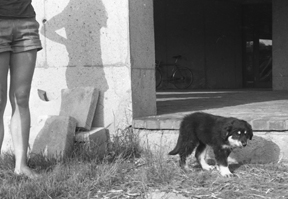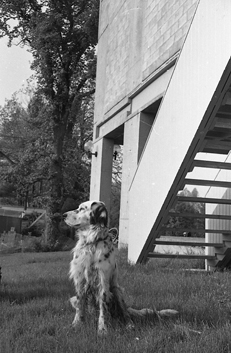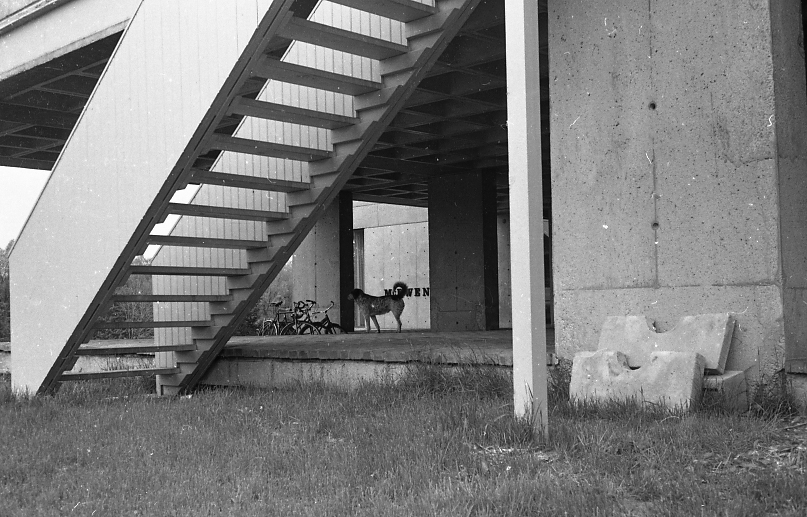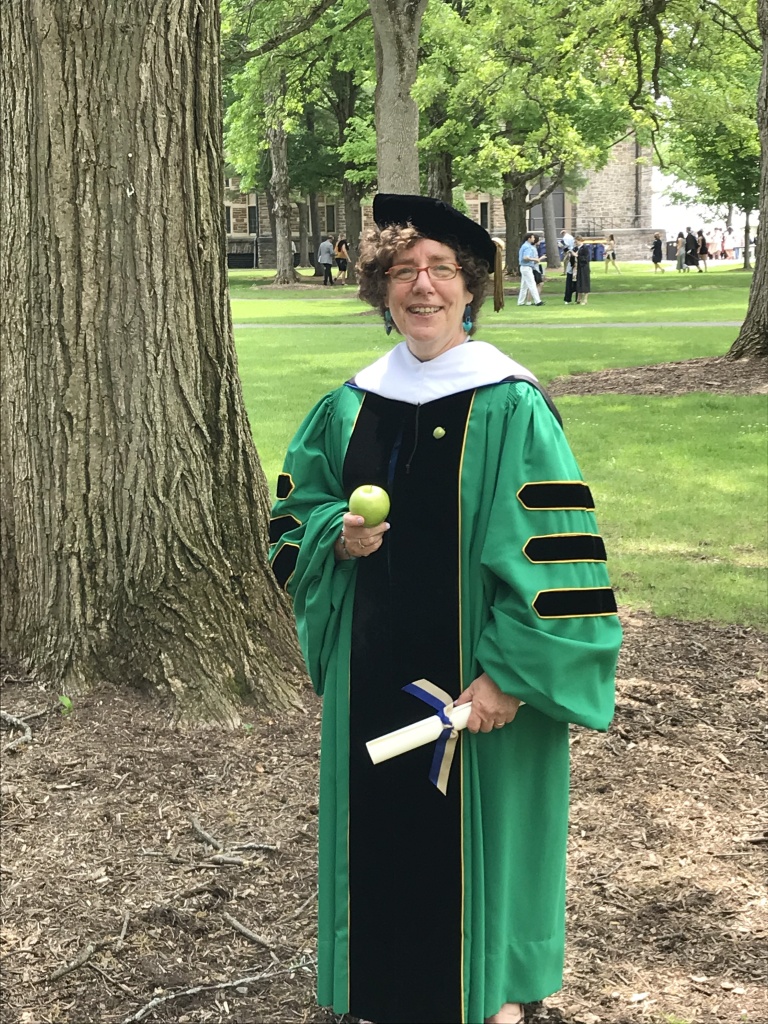Try to Remember When Life Was Slow and Oh, So Mellow
What do you remember about spring semester in 1973? Do you recall any important events or memorable milestones? Caroline Webber, K’73, has collated headlines from the campus weekly newspaper, The Spectator, which might spark some recollections. It’s clear that our young college was taking root and facing growing pains. The publication’s masthead had evolved as well:


January 22, 1973
Colleges Receive Grants to Further Ed Objectives
Kirkland receives Kresge Foundation grant and Mellon Grant for Kirner and Johnson buildings and faculty development.
February 2
Advisory Commission to Study Kirkland Sciences
Initiated at the behest of Samuel Fisher Babbitt, the commission will also examine ways of fulfilling Kirkland’s coordinate obligations to HC.
Yale-Based Course on Sexuality Offered to Confront Ignorance
Kirkland to Expand Enrollment to 650
Middle States Association Grants Kirkland College Full Accreditation
Kirkland is accredited by the Commission on Higher Education of the Middle States Association of Colleges and Secondary Schools.
February 9
Hamilton Adopts New Policy; Hires Women and Minorities
According to the article, “Hamilton College has had few women faculty members since it was founded. However, two women have been appointed to the faculty recently, one temporarily and the other permanently. … This upsurge in the percentage of women professors on the Hill was caused by a few factors. Possibly the most obvious reason is the new and existing guidelines for women and minority hiring that the federal government has established. These guidelines prohibit discrimination against any people on the grounds of race, creed, color, sex, or national origin. The ‘Affirmative Action Program’ is the name for the program that has tried to encourage the hiring of minority groups and women. … A less obvious reason for hiring these women, but actually the most important reason was the fact that they were the best that could be found, either male or female.”
Lettuce Boycott.
This week marks the beginning of a campaign to organize a lettuce boycott on the Kirkland-Hamilton campus. The campaign corresponds to a nationwide endeavor on the part of the United Farm Workers, to put a halt to the consumption of all non-union lettuce.
Kirkland Trustees Will Review Mature Plans for Co-op Dorms
February 16
Is Winter Study Working? Deans Review Responses
Kirkland Faculty Rejects Course Evaluation Questions
The Kirkland faculty rejected a SCACA subcommittee course evaluation questionnaire at their meeting last Tuesday. Students concerned about this rejection re seeking to devise a method of evaluation that would provide valuable information for both faculty and students.
‘Don Juan in Hell’ on Stage; Sam Babbitt in title Role
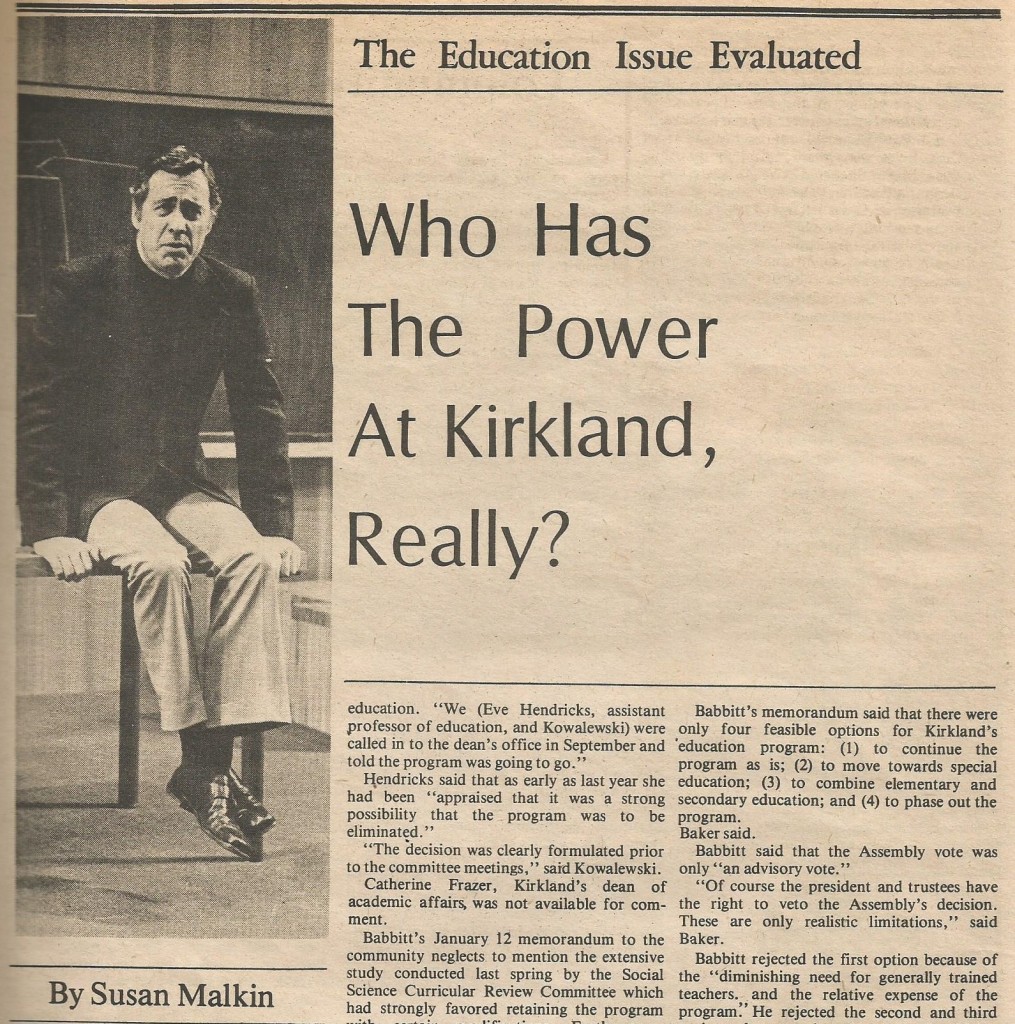
Kirkland Honored as Member of Union of Experimenting Colleges
KC has recently been accepted for membership to UECU, “a national consortium fostering research and experimentation in higher education.”
February 23
Babbitt Discusses Budget, Staff Changes in Annual Talk
Betty Bouch, Dean of Residence, to leave at end of the year. “We will break even again this year” was the outlook projected by President Babbitt concerning finances…. However, Kirkland will suffer a projected deficit of $750,000 for next year, and the Board of Trustees will only approve one of $500,000. They are hoping to raise a half million dollars, and to cut the remainder from the budget as it now stands.
Outbreak of German Measles on H-K campuses (25+ cases)
Animal Registration.
If you have already registered a dog last semester, you will be billed automatically for this semester. If you have moved…please notify the Humane Society. The following dogs have been restricted because they were seen three times last week in McEwen and/or Commons: 1) Morgan, 2) Olive, 3) Chochie, 4) Fritz, 5) Tracy, 6) Maggie, 7) Hector, 8) Chob. If you see any of these dogs in a dining hall, please send a slip noting the dog, the date and time and building to the Humane Society.
Crisis Center Closes, Changing Needs Cited
“…According to its founder and co-ordinator, Debbie Spears K’73, ’Upstairs’ closed because its staff felt that it was no longer an effective vehicle for dealing with student problems.”
March 2
SIMS (Student international Meditation Society) Plans Kirkland Course In Transcendental Meditation
Choirs Trek To NYC Monday To Perform Mass at Town Hall
– Paul Kuent Chamber Orchestra of Paris and Hamilton-Kirkland Choir
USSR Winter Study: Unique Cultural Exchange Includes 21 students from HC and KC
March 9
Trustees Favor Co-op Life; Can Not Sponsor Finances Trustees agreed in theory but main obstacles are financial ones.
Kirkland Steering Committee Discusses Commencement. Seating plan provides for a total of 800 people; luncheon to be held before commencement. “The concept of allowing any senior to make a speech when she receives her diploma remains.” No designs have yet been submitted. Students will be free to decorate their diploma as they wish. Kirkland will also provide conventional diplomas. Dr. Margaret Meade had been considered as keynote speaker but she will be in New Guinea at that time. Committee attempting to contact Ms. Eleanor Holmes Norton, Commissioner of Human Rights of NYC [now U.S. Rep for D.C.].
April 6
PIRG [Public Interest Research Group] Formed on College Hill PIRG I modeled after Ralph Nader’s Washington, DC organization. Organized by states, the non-profit, non-artisan independent groups are working for constructive social change benefitting the citizens of each state. PIRGs are designed to transcend the lack of continuity and lack of expertise which beset many student movements. PIRGs employ a full-time staff of professionals from various disciplines who work on environment and consumer protection, health and safety, racial and sexual employment practices and similar issues.”
April 13
Attrition Analyzed. HC attrition rate 20-25%, stays the same over 10 years; Friedensohn not displeased with 25% Kirkland attrition; helps assess progress. One out of 4 members of Kirkland Charter class did not graduate.
Babbitt on Kirkland College: Innovation Is Key Factor Kirkland College Conference on Teaching and Learning conclusions by SFB: “…innovation was the difference between institutional life and death for Kirkland College. …Although he admitted that change incurred the risk of failure he warned that if college did not question whether the way they were teaching could be done better, faculties would become ‘maintenance people’ not educators.” More than 200 educators and students from 10 different colleges attended the conference.
April 20
Meat High in Fat; Service Systems Inc. Acts The fat content of meat purchased by Service Systems Inc. from area distributors exceeded contract standards and, in one case, exceeded Federal standards, according to a recent test conducted by Judy Steinlauf ‘73. … Ms. Steinlauf, who is considering consumer law as a possible career, begin the project as a part of the Action studies course directed by Dean Doris Friedensohn.
Service Systems agrees to serve only farm workers union lettuce in McEwen and Commons dining halls. Student Food Committee gathered 800 signatures on a petition, pleased with the service’s cooperative attitude in the endeavor.
April 27
Kirkland as a Women’s College Considered Evaluation Team representing the Commission on Higher Education of the Middle States Association. Report to the Faculty, Administration and Trustees of Kirkland College.
Some points: their impression is that Kirkland’s distinctiveness could be “maintained without significant change” if student body became co-educational. That is to say, if KC is as committed to being a women’s college as it is to an innovative one, it needs to take some important steps: Trustees approve a “Committee on Kirkland as a College for women” (has done this); currently “no effective focal point at Kirkland for students concerned with the status of women in society in general, and at Kirkland in particular. Previous attempts by interested students to carry out appropriate programs have often met with many obstacles: an apathetic student body, the feeling that nothing could be accomplished at an administrative level, a lack of funds, etc.” Informal committees are being formed in these areas: women’s film society, women’s advisory committee on careers, McIntosh collection of women’s books, a feminist radio show, a day care center, a newsletter.
Colleges Confront Computer Problem HC doesn’t own or lease any computer facilities; there are several teletype machines hooked into a central machine at Griffiths Air Force Base (Rome, NY). An ad hoc committee has been formed. Explanations of why computers are important for doing research and data storage. “People will be surprised,” [Jonathan Vaughn] stated, “at how rapidly a new system would become inadequate.” This apparently raise the problem of installing a computer which will not become obsolete in too short a time. …
N.Y. State Dorm Authority Funds K-H Co-op Dorm
Kirkland Third Commencement Ceremony: Babbitt and Coffin Will Address Grads Beer and Lunch Party for graduates and a limited number of guests. Day’s celebrations will close with a Champagne Party. Graduation exercises will be conducted in a tent accommodating 1000 people. William Sloane Coffin, Chaplain of Yale University and an anti-war activist will be the guest speaker. Open mike. Class voted to model their diplomas after the Hamilton graduation certificate. President John J. Chandler, who leaves Hamilton in July to assume the Presidency of Williams College, will receive the Kirkland President’s Medal.
During the week before graduation, the student committee…will sponsor art exhibits, plays and skits as part of the celebration. The committee also plans a Pot Luck Supper for graduates and their parents Monday May 21.
Folk Festival Next Weekend; Best From East Will Be Here
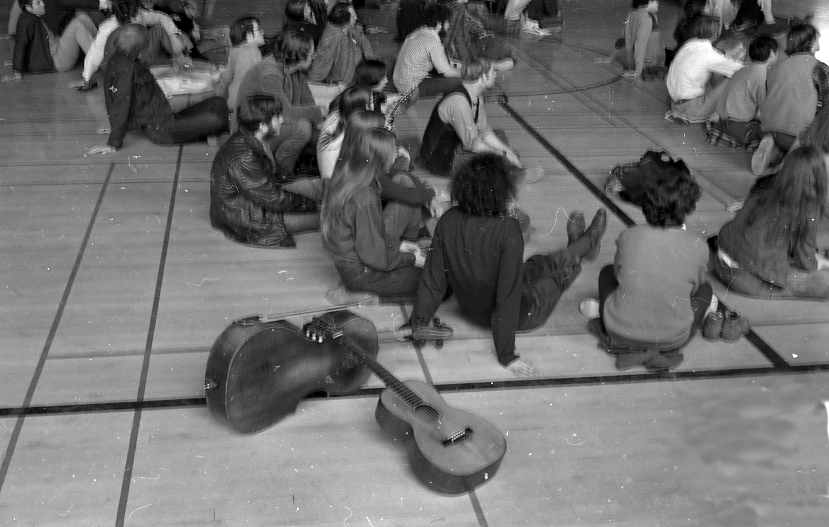
May 3
Vietnam Withdrawal to be Discussed May 8th
May 23
Letter to Editor, by Julie Barsel K’73 “Dis-May on the Hill: It being May, that time of year when surviving members of the graduating class are tallied, many were surprised to find a new name on the roster. Having achieved every other imaginable degree, Mother Nature decided that it was high time she achieve one from college, weather or not it would chalk her highs any higher or her lows any lower, by the men at the Bureau. And so, it also being that last minute time when requirements are retallied, it was found, much to the dis-May of the entire Hill, that Mother Nature was lacking one Winter Study credit. And it being customary to forewarn those in such a situation, the Dean called mother Nature into her office, where upon learning the bleak news, Mom stormed out to see what she could do. And she did. Which is why it snowed last Thursday and Friday … which is why the moral of this story is offered; Give credit WHEN credit is due!”
Babbitt Speaks on Women in Higher Education Transcript of speech, Women and Change in Higher Education, delivered by SFB at Smithsonian institution to National Council of Women. Quote:
“The things we thought would be good education for women in 1968 and ’69 appear to us now to be good education for people in 1973.”– Samuel Fisher Babbitt
(And beyond!)
Get With the Program!
We all have our names inscribed on a tall wall in the Kennedy Arts Center on the Hill (go, and look for yours!). But can you name everyone who graduated with you? As we enter the commencement season, we thought it would be fun to share the Kirkland graduation program from this year’s 50th reunion class of 1973. Click on the image for a closer look!
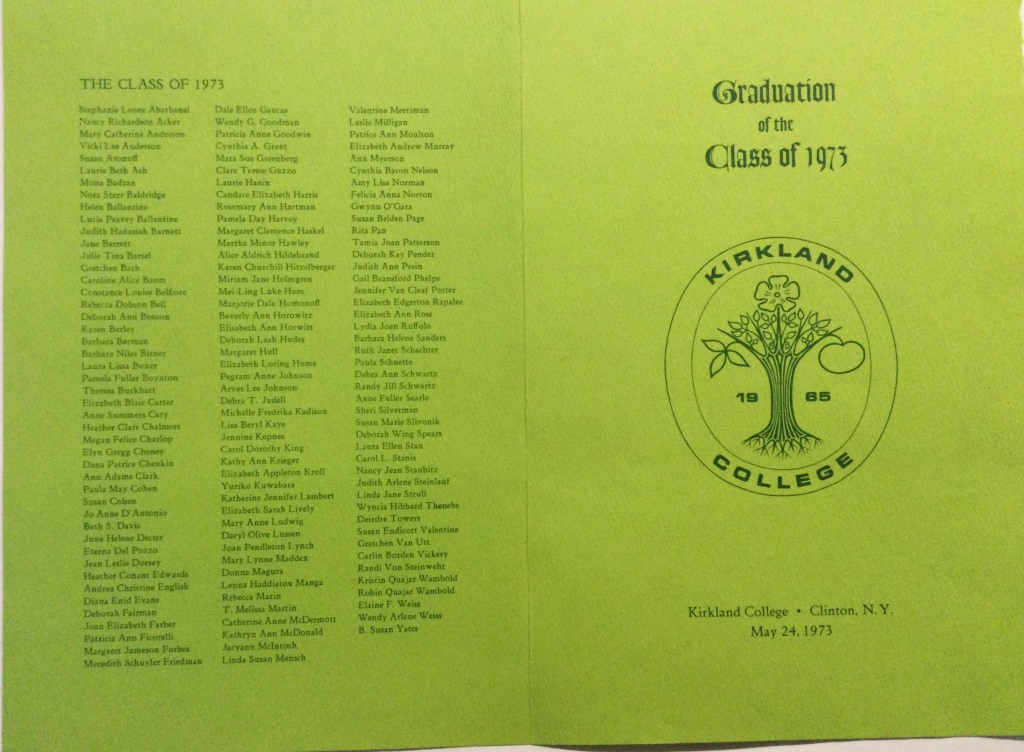
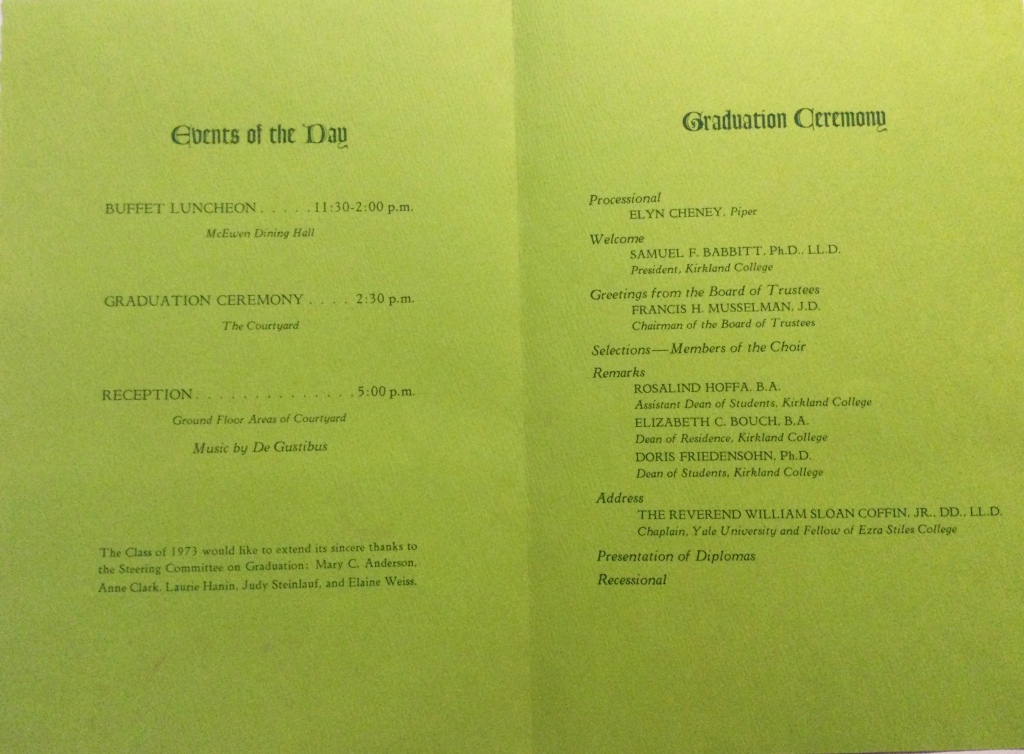
(Program courtesy Jennifer Potter Hayes K’73.)
Kirkland’s Last Graduating Class
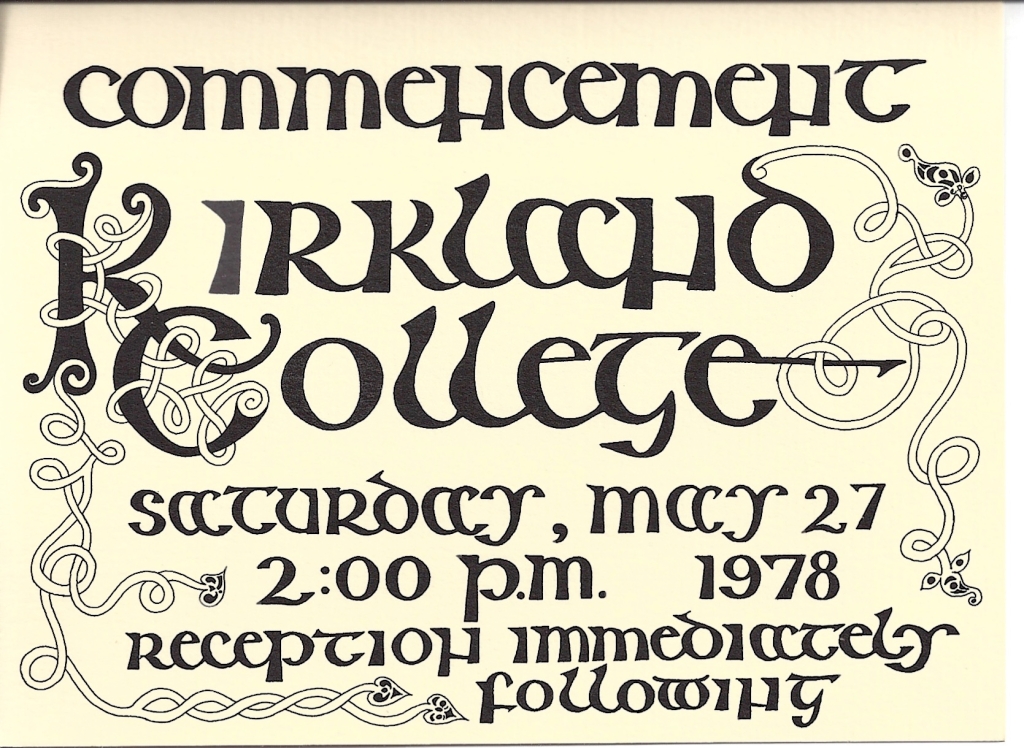
Takeover. Appropriation. Acquisition. Consolidation. Seizure. Absorption. Merger. Whatever you call it, Kirkland officially closed after the conclusion of the spring semester in 1978. As a result, the senior class—my class—holds the ignominious distinction of being known as the last graduating class of Kirkland College. For some, this epithet is a badge of honor. For others, it’s a painful reminder of the bruising process that students and faculty endured during the unexpected merger of two coordinate educational institutions.

Let’s back up to set the stage. It was spring in Clinton, when snow had finally melted and apple blossoms dotted the landscape. On May 9, 1977, students were summoned to an important community meeting at 4 P.M. in the Kirner-Johnson Auditorium (not the Red Pit as Sam Babbitt’s account in Limited Engagement asserts).
Until this point, many of us had no idea that there was a problem. Others had heard whispers of financial pressures, but it all seemed vague. Besides, as students, were were consumed by exams and plans for summer. Ironically, Kirkland was about to launch The Campaign for the Second Decade! So the meeting in which President Babbitt outlined the financial predicament Kirkland faced and the potential outcome if Hamilton did not agree to support the college financially was a gut punch. You could hears the gasps and see the worry and confusion etched on the faces of the men and women who attended the meeting. Students wondered, Should I transfer to another college? Fight back and save the college? Wait and hope for the best?
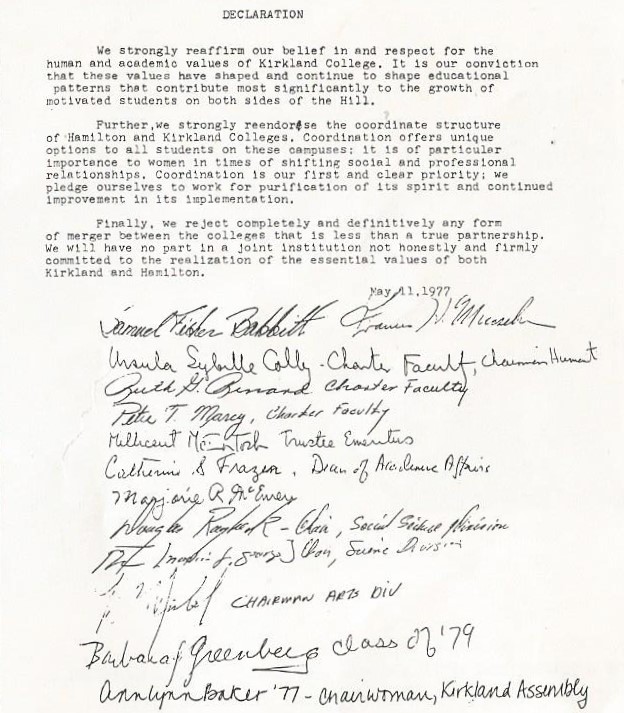
In Limited Engagement, Sam details the complex chronology of failed negotiations and the eventual merger on pages 316—392. Following an anxiety-riddled summer, Kirkland students continued protest efforts that had begun in spring 1977 after the proverbial cat had been let out of the bag. We circulated petitions, wrote telegrams and letters to Hamilton trustees, raised money, and wore green armbands and T-shirts with clever slogans like “Living Together is Better Than Being Married.” Many of us organized or attended on-campus protests, and alumnae held meetings in various cities around the country. Can you imagine how distracting this was for seniors trying to complete final course work and “capstone” senior projects?
Ultimately, the best efforts of students, alumnae, faculty, administration, trustees, parents, and fans of Kirkland did little to persuade Hamilton to preserve our ten-year coordinate system. Before the two colleges officially parted ways, the class of 1978 had its graduation with all the pomp and ceremony we could muster. Our families and friends joined the celebration, and then we were off to explore the world. As Sam put it in his last Kirkland commencement speech:
In every course, and in a variety of ways, it was our aim to sharpen your perceptions—to sharpen what you see and how you see it, be it a physical object or a sequence of words in type. The name of the game is to raise your perceptions by giving you a greater and deeper context in which to see, or hear, or feel, and then to give you the scholars’ tools so that by ordering and by comparison and by evaluating, you can understand past judgments about the materials you study and make the first forays into judgments of your own. . . .Finally, in the Senior Project, which you have cursed and loved alternatively, you have been given a solo flight. If you and we did well, that project was process checked out, product produced, and certification that you are what we hoped you would be—your own person.
Over time, the foundation of what so many had carefully constructed was gradually dismantled and relics—physical, curricular, cultural, spiritual, architectural—of what was Kirkland disappeared seemingly into thin air. As we heard from a handful of classmates and staff years later, some bore witness to photos, files, and other materials documenting the existence of Kirkland being tossed into a dumpster. Several bravely dove in, rescuing these vitally important remnants of a bold decade in women’s education. As a consequence of the 1978 merger, some alumnae felt such anger and disappointment that they refused to engage with Hamilton under any circumstances, whether that meant traveling back to the Hill for reunions or receiving alumni-related mailings and emails. Others tried to forget and move on, often resorting to the practical option of listing Hamilton as her college, rather than naming Kirkland. Whatever your own feelings are about the ending of Kirkland College, women and men in the classes of 1977, 1978, 1979, 1980, and 1981 lived through it. Perhaps more importantly, they were impacted and forever changed by the experience.
In recent years, I’ve wondered about the clunky way the merger was handled by Hamilton and its trustees. Could the bitter fallout that to a certain degree persists forty-five years later have been avoided? Was there a more sensible way to have joined the two colleges and to have addressed the traumatic impact of the merger on students? Looking back, we didn’t have support groups, social workers, mediators, or psychologists to guide us through what was happening. We didn’t have an advisory council, as Pembroke did, to create its own center and conduct an oral history project after being merged with Brown University. In 2023, it seems to me that there’s still much to learn about mistakes made in the process by studying the care and conduct with which other coordinate colleges such as Rutgers/William Douglass, Urseline/Bellarmine, Harvard/Radcliffe, and Tulane/Newcomb handled their splits.
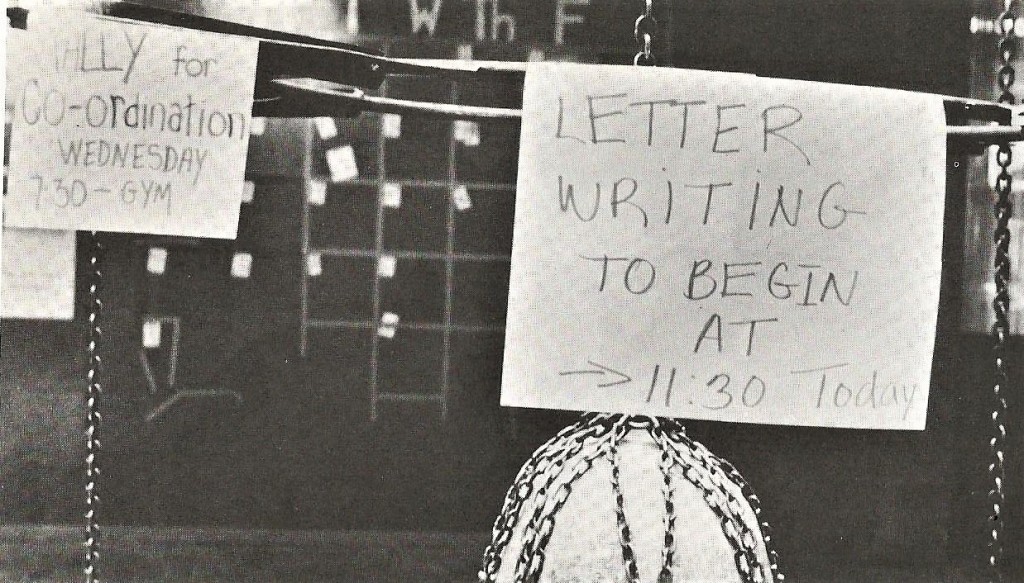
Despite conscious or unconscious attempts to expunge Kirkland from the Hamilton campus, Kirkland alumnae have persisted. In small and significant ways, we’ve found ways to keep Kirkland’s legacy alive by celebrating its innovative curriculum, commemorating its campus architecture, and continuing its commitment to women. Indeed, there is much on the Hill that reflects how Kirkland’s students, faculty, and administration contributed to make Hamilton the institution it is today. When you are there, ask a current student about the college’s open curriculum, concentrations, American studies, creative writing, and senior projects. Ask about the campus literary magazine Red Weather, the Womxn’s Center, and the all-women Special K a cappella group. All of these are Kirkland carryovers. And check out the Kirkland Gate, the Kirkland Wall, the Kirkland Alumnae Authors bookshelf in the Hamilton College bookstore, and the Kirkland Green. These are initiatives suggested, created, and carried out by our alumnae.
What was your class year, and how did the merger affect you?
Honoring Our Own
As we’ve mentioned in earlier posts, Kirkland is still present at today’s Hamilton graduations. Many graduates carry on a tradition of presenting green apples to Hamilton’s president or wearing apple pins (you can find those stories at these links: Graduation Kirkland Style and Gone – But Not Forgotten). 2022 was no exception, but truly exceptional: two of our own took part in the ceremonies.
At Hamilton College’s 210th Commencement on May 22, 2022, author Elaine Weiss (K’73) received an honorary Doctor of Letters degree. Appropriately, Elaine received this honor from fellow alumna Susan Skerritt (K’77), who is also a lifetime Hamilton trustee.
We thought it would be worthwhile to include here the written text of what Lori Richard Reidel (K’77), President of the Kirkland College Alumnae Association, recently shared with us via email. You can also watch the video, starting at about the one hour mark: https://www.youtube.com/watch?v=iD4b5i_8hRQ
Here are Sue’s remarks before conferring this honor.
Having recently celebrated the centennial of the 19th Amendment’s passage, it is most fitting to honor your accomplishments as an author and journalist, because your highly regarded book, The Woman’s Hour, illuminates the little-known, final battle in the suffragists’ fight to win the right to vote.
With deep research, historic perspective, and terrific storytelling, you bring to life leaders on both sides of the struggle that unfolded in Nashville, TN. The Woman’s Hour, praised in The New York Times and in many other reviews, and has been called a “riveting, nail-biting political thriller” with “powerful parallels to today’s political environment.” Accolades include the American Bar Association’s Silver Gavel Award, the group’s highest honor for media and arts that furthers public understanding of the law and justice system.
You said in an interview, “My hope is that the story I tell in The Woman’s Hour, the defining battle in Nashville and the saga of the suffrage movement, will reassure a new generation that protest is patriotic, and will inspire American women — and men — to honor the legacy of these warriors for democracy by registering and voting in the next elections.” You can be sure you have motivated readers to value what the suffragists strove so long and hard to achieve.
The book was just the latest achievement in an award-winning career that stretches for decades. Your first book, Fruits of Victory: The Woman’s Land Army of America in the Great War, explored another little-known piece of history — the women “farmerettes” who were dispatched to rural America to take the place of men who went to fight during World War I.
You’ve written for The Atlantic, Harper’s, The New York Times, and other publications and media outlets, receiving a Pushcart Prize “Editor’s Choice” award. We would like to think the spirit of Kirkland College runs through your work and through your passion for democracy. With great admiration and respect, we present you with this honorary degree.
At a celebratory dinner the previous evening, Elaine gave this speech to Hamilton’s president, senior officers, faculty members, trustees, and the other honorees.
Thank you President Wippman, trustees and faculty, for this honor: allowing me to join the long and distinguished list of Hamilton Honorary Degree recipients, and enter into the small sorority of Kirkland educated-women who’ve been accorded this degree:
My friend Christie Bell Vilsack—an educator and public servant in so many notable roles,
The brilliant social commentator and cartoonist Roz Chast,
And the Pulitzer Prize-winning composer Melinda Wagner—who entered as a K student, but holds a Hamilton degree.
Tomorrow I will march in the Commencement procession wearing a green Kirkland academic robe, which belonged to Kirkland’s first Academic Dean, Dr. Inez Nelbach. It is a very rare and special garment: there are only two in existence—Sam Babbitt owns the other one– and both are over half a century old. They have a charming history:
In truth, there is no such thing as a Kirkland gown: the graduating classes chose not to wear gowns and mortarboards, we wore our own clothes to the ceremonies—a rainbow of color and styles. The faculty wore, as Prof. Thomas Colby phrased it, the “academic racing silks” of their own PhD institutions.
But founding Kirkland Trustee Grant Keehn—also a member of the Hamilton board–thought that for the new college’s inauguration of President Babbitt and Dean Nelbach, the academic officers should have proper Kirkland Green robes. Such robes did not exist—so he had them made.
I will be wearing Dean Nelbach’s—which has been kept safe all these years by a Kirkland alumna. The gown is a bit long on me—Dean Nelbach was a more imposing figure than I am—but it will be fine. I’ll try not to trip.
And when I am hooded with a blue Hamilton honorary degree hood tomorrow morning—the blue adorning and supplementing the green–it will be the visual manifestation of how the two colleges worked together to educate their students—women and men– who were privileged to draw from the very different strengths of both institutions for a decade. It will be symbolic of my—and all Kirkland women’s–dual education on this Hill.
When I accept the Honorary Degree tomorrow, I will be representing all my Kirkland sisters; we are a small and finite band of spunky women.
We are the women who came to this Hill as brave pioneers, as agents of change. As visionaries and builders, as intrepid explorers of new paths. We changed this Hill forever. And the legacy of Kirkland can be felt in an invigorated Hamilton today.
In just a few weeks, the first Kirkland women to climb this Hill—the Charter Class—will be returning here to celebrate their 50th reunion.The first woman to ever deliver a 50th year Annalist Letter for her class –Betty Haggerty Marmon ’72—will speak from the pulpit in the chapel. Many of us: Kirkland alumnae and faculty and administrators—will be returning with the Charter Class for a grand All-Kirkland reunion weekend. I’ll be there.
So will Samuel Fisher Babbitt, Kirkland’s first—and only—president, returning to greet the Kirkland women—now (ahem) Senior Citizens—whose lives Kirkland touched so profoundly on this Hill. I don’t think he’ll be wearing his green robe, but it will be historic. And bittersweet.
My education of this Hill—the green and the blue—the Kirkland and Hamilton—prepared me, in mind and in spirit—to write the books of history for which I am being honored with the Honorary Degree.
It’s no coincidence that these books are about women pioneers—iconoclasts, change makers: they were Kirkland-type women, just ahead of our time.
They are women whose names—and accomplishments—were, for the most part, unheralded. Women who faced societal and political resistance, and personal attack, as they used their wits and strategic genius to overcome obstacles to women achieving autonomy, agency, and equality. Doing what had never been done before.
Their roles in making history had been ignored for so long—though the historical record revealed a much richer story of their participation. And I wanted to tell that story.
My most recent book, The Woman’s Hour, is about extraordinary women organizing to win the vote, centered on the drama of securing the ratification of the 19th Amendment.
It was one of the pivotal political battles in American history, and women were at the center, the driving force, of it. There are many timely lessons to be learned from the suffragists’ tactics, and their persistence–and even from the opposition they faced. The arguments against equality they heard then are still being voiced today.
I dedicated the book to Natalie Babbitt—my mentor and close friend for four decades, who, as I say in the dedication, taught me how to be a writer. She and Sam supported and encouraged me long after we’d all left the Hill. Natalie died just a week before I turned in the manuscript for The Woman’s Hour—portions of which had been written sitting on the Babbitt couch in New Haven.
The spirit of Kirkland –the ethos of exuberant exploration–has animated my life—and my career: giving me the nerve to try something new and scary—a new career—leaving journalism to write books–after my 50th birthday. Venturing into a new field—narrative history—without an academic historian’s credentials. And parachuting into new topics with each new book.
It is all, well, very Kirkland.
When I wrote The Woman’s Hour I thought I was just writing a book of history–a great story in itself: about how half of the citizens of the nation rose up to demand they have a voice in their own government. Even if it was not written into the Constitution: the Founders had no intention of allowing women to participate in our government “by and for the people”.
Then change the Constitution, the suffragists said. And they forced that change.
But I could not know that we’d now be in a time when the themes of the book are actually in our headlines today: voting rights again under attack; essential women’s rights in jeopardy; our democratic system itself under siege.
And books of history are being banned by state legislators and local school boards, because they reveal uncomfortable truths. I’ve been alerted that The Woman’s Hour—especially the Young Readers edition used in schools and libraries—might well be banned from use in several states.
States where recent laws forbid teachers discussing, or using books, that deal with controversial aspects of our history. Laws requiring librarians to submit the titles on their shelves to a state-appointed commission for approval.
It’s true: The Woman’s Hour deals extensively with the racism and misogyny at the heart of the battle over women’s suffrage: I’m very proud to have caused such therapeutic discomfort. I know my Kirkland and Hamilton professors would be pleased.
Tomorrow I’ll march with the Hamilton Class of ’22. I’m sure they’ve been equipped with the intellectual tools and critical skills to face the challenges of the challenging and frightening world they’ll be entering.
But I hope they will also carry with them some of the Spirit of Kirkland that still abides on this Hill: giving them the audacity to make bold moves, take big chances, and tell the hidden stories that need to be told.
We’re so thrilled to have our alumnae recognized in this meaningful way, particularly in a year in which the Charter Class is celebrating its milestone anniversary.
